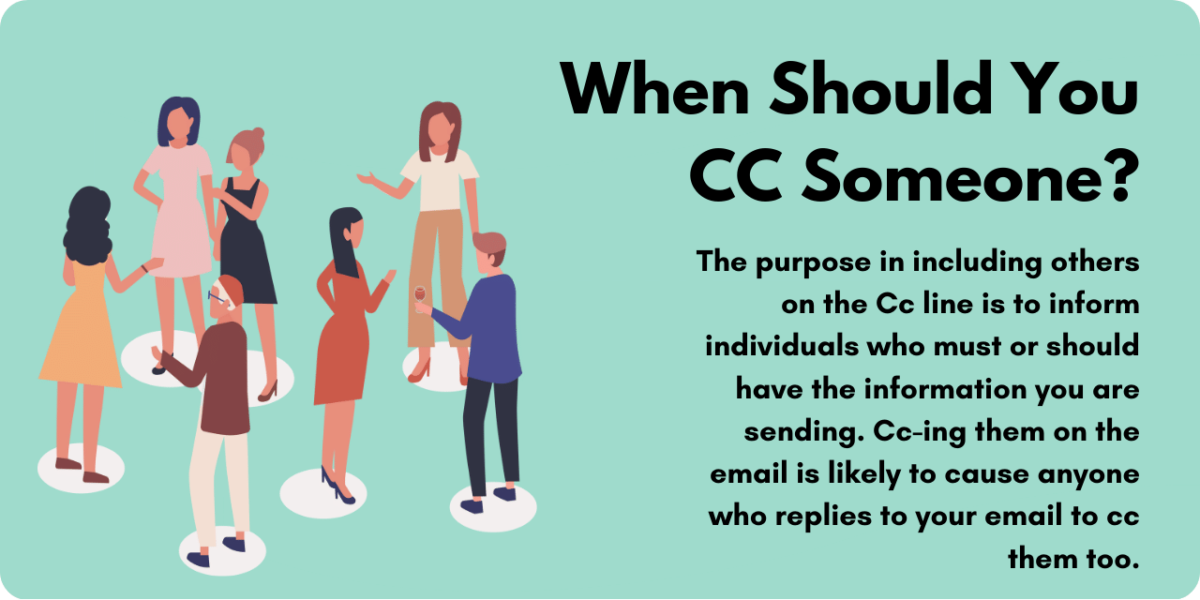Do you know when to copy people on the emails you send? Or do you cc a bunch of people and hope to offend no one? This post will reduce your cc doubts.

Should you cc or not? To answer that question, remember that your purpose in including others on the Cc line is to inform individuals who must or should have the information you are sending. These individuals do not need to DO anything in response to the email. They only need to know about it. Only include people on the Cc line who need to be in the know.
But wait—there’s more to think about. Before you include your supervisor and your team members—who may want to be in the information loop—recognize that ccing them on the email is likely to cause anyone who replies to your email to cc them too. Do your supervisor and team members need all those emails? If not, don’t tie them into the email conversation.
Below are frequently asked questions, with suggestions.
Question 1: If I don’t cc my supervisor or team members, how can I keep them informed?
Answer: Think about how much information those people need. Let’s say your email thread will cover bugs in a new software release. If your supervisor does not need all the back-and-forth emailing, just send him a summary email or periodic updates. The same goes for your team members: If they will want the hundred emails that may attach to this thread, cc them. Otherwise, just choose to update them as needed.
Question 2: If I receive an email on which people are copied, should I reply to all?
Answer: If you know the other people and you understand why they are included, do cc them, of course. But if you do not know the people or the reason they are included, feel free not to cc them (unless your organization’s email protocol is different). The individual who sent the original message can forward your email if necessary.
It is not your job to reply blindly to strangers. The person who initiates the email should say either “Please reply to all” or “Please respond to me only.” The writer should also explain why people are on the Cc line or are being added to it. For example, “I am ccing Bill Davis because he has joined the group. Please copy him on your reply.”
Question 3: If I want my director to know that I have handled a situation, shouldn’t I copy her on my email? But then how do I stop others from replying to her too?
Answer: Include your director on the Bcc line, and others will not be able to reply to her. If you are concerned that she (receiving a bcc) may mistakenly reply to all and wrap herself into the conversation, simply forward your email to her with a one-sentence explanation.
Question 4: If I cannot get action from someone, should I cc our managers to show that I am ready to take the issue to the next level?
Answer: Ccing your managers IS taking the issue to the next level. Rather than taking that step, which may feel like blame or pressure to the other person, ask for information first: What is causing the delay? When can you expect action? How can you help the other person take action? Eventually you may need to let the individual know that your next step could be to turn to your bosses. However, emphasize that you would prefer to resolve the situation together.
Here is a guide on things you could try if you can’t get a response via email.
Question 5: My boss wants to be copied on every email I send to clients. Is this a standard practice? It seems awkward.
Answer: It is not a standard practice, and the behavior has several disadvantages: It can suggest to clients that you are a junior employee who must be closely supervised; make clients feel they should address him rather than you; rope him into even the smallest, least important exchanges; and encourage him to micromanage your client interactions.
Ask your boss whether sending him client updates will meet his needs. Another option is to forward any important emails to him, so he will be aware of what is going on.
Question 6: Are there obvious circumstances when I should NOT cc?
Answer: Remember this essential rule: Only cc people when they must have or should have the information. Routine emails that should not typically include ccs are thank-yous, straightforward yes or no answers (unless everyone must know your answer), brief compliments, and “I don’t know” replies. Also, do not copy people on constructive feedback, denials, or reminders—messages that could embarrass the individual whose name appears on the To line.
Question 7: I am buried in copies of emails I do not need. How can I encourage people to copy me less often without making them think I don’t care what they are working on?
Answer: If the emails are from people in your work group, why not have a group meeting to discuss your email standards? Together you may be able to identify great ways to be more efficient about ccs.
With people outside your work group, check to see whether you can remove yourself from email lists you don’t need to be on. For example, maybe you are receiving copies of all the safety incidents, when safety is not your current job focus. Or maybe you are included in duplicate lists. Beyond that, you might send an email in which you reply to all this way: “Thanks for including me. At this point, I do not need to be involved in the ongoing discussion. Can you please remove me from the cc list but inform me of the group’s decision?” If you are dealing with one person, write, “I don’t need to be copied on these routine communications. But if you feel I need to know about a specific situation, do cc me.”
Learn guidelines for bccs in our article “Bcc: Use With Caution.”






